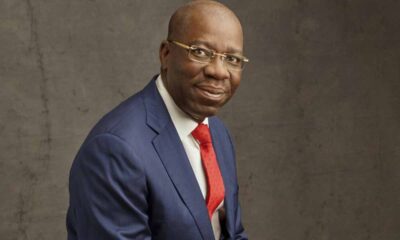States Are Not Remitting Staff’s Contributory Pnesions
All state governments’ retirees in the country suffer either outright non-payment or long waits to access their pension benefits under the Contributory Pension Scheme.
Industry watchers have blamed this ugly trend on lack of political will by state governments to ensure a functional pension scheme in their states.
Retirees of states that have complied usually wait for between two and six years before they get paid, a source at PenCom said.
Status of implementation of the CPS in states as of June 30 showed that only four states and the Federal Capital Territory Administration had high level of compliance according to the National Pension Commission.
The commission listed theses five states that were funding the accrued rights of their workers regularly and commenced payment of pensions as Lagos, Kaduna, FCT, Osun and Delta.
Despite their higher level of compliance, these four states and the FCT still delayed in commencing pension payments to their retirees.
Lagos State, for instance, that received the National Pension Commission’s award on compliance has not started paying retirees that retired in 2018, 2019 and 2020.
The complying states blamed the delay in payment to backlog of arrears that needed to be cleared.
Anambra was funding the accrued rights of Local Government workers but not paying pensions under the CPS according to PenCom’s compliance list.
Five states with other pension schemes apart from the CPS are Jigawa, Kano, Yobe, Gombe and Zamfara.
The states at bill stage of joining the CPS are listed as Kwara, Plateau, Cross River, Borno, Akwa Ibom, Bauchi and Katsina.
The second quarter 2020 report of PenCom stated that 25 states had enacted pension laws on the Contributory Pension Scheme while seven states were at the bill stage.
Out of the five states operating other pension schemes, four states had adopted the Contributory Defined Benefits Scheme while one operates the Defined Benefits Scheme.
Among the states that had enacted laws on CPS was Niger State which suspended the implementation of the CPS in April, 2015.
However, the state governor recently approved the resumption of the scheme with effect from June 2020.
Among the states that adopted CDBS, Jigawa State was the only state that was fully implementing the scheme by consistently remitting employee pension contributions to selected PFAs to manage and had conducted actuarial valuation to ascertain any shortfall in the fund.
Kano State was yet to transfer its pension funds to licensed operators, and had huge arrears of pension liabilities as of the end of the review period.
Zamfara and Gombe States were yet to commence implementation of the CDBS as of the end of the quarter.
The Chairman, Trade Union Congress, Ogun State, Olubumi Fajobi, decried the backlog of arrears of pension and long waits suffered by retirees under the CPS.
He said, “Take Ogun State for example; we have a very large backlog running to almost N40bn that has not been remitted and that is for about 107 months.
“However, the government is taking steps to redress this.”
He worried that the governments were not committed in terms of remitting the contributions of workers.
Fajobi said, “The waiting period is also of concern for those who are accessing it. We have people waiting for two, three years before they can access any fund from the CPS after retirement.
“This makes a whole nonsense of the scheme from the 2004 reform and also for 2014 laws.”
The President, Association of Senior Civil Servants of Nigeria, Bola Audu, said any state that was not ready for the CPS should not start it, and those who started should endeavour to run it properly and not frustrate retirees.
“Pension is something somebody has worked all his life for and he intends to earn it when he is no longer able to work. So when you now play politics with those who are in pension, I don’t think it is a good idea at all,” he said.
A former President, TUC, Peter Esele, who described the pension situation as unfortunate said it encouraged corruption because those in active service were seeing the sufferings of retirees, and would want to amass as much funds as possible before they retired.
The Director, Centre for Pension Rights Advocacy, Ivor Takor, said the Pension Reform Act in 2004 created a lacuna.
What became obvious was that employees of states and local governments were not covered by or were excluded from the coverage of the Pension Reform Act 2004, he said.
Takor said, “The exclusion was not an oversight by the committee that carried out the reform, neither were sates and local government employees not covered in the executive bill that was sent to the National Assembly.
“Employees of states and local governments were covered in the executive bill sent by the President to the National Assembly.
“On the bill reaching the National Assembly, governors mobilised representatives of their states in both chambers of the National Assembly to remove employees of states and local governments from the bill before it was passed into law.
“Their reason was that the country was under civil rule; therefore, there must be the practice of true federalism, which does not allow the National Assembly to make laws for the states on an issue such as pension, which does not fall in the exclusive legislative list of the constitution.”
Takor said the mischief that found its way into the PRA 2004 was cured in the PRA 2014, which made the provisions of the Act to apply to any employment in public service of the Federation, Federal Capital Territory, states, local governments and the private sector.
Chairman, Federal Concerned Pensioners, David Adodo, lamented the treatment of senior citizens, who were denied their pension benefits.
The Allianz Global Pension Report 2020 recently ranked Nigeria 64th place, especially because of the insufficient adequacy of its pension system.
However, the acting Director-General, PenCom, Aisha Dahir-Umar, said the commission had continued to engage the state governments on compliance through interactive sessions, training and workshops.



 Naira4 weeks ago
Naira4 weeks ago


 News4 weeks ago
News4 weeks ago


 Naira4 weeks ago
Naira4 weeks ago


 Travel3 weeks ago
Travel3 weeks ago




 Jobs4 weeks ago
Jobs4 weeks ago
 Naira3 weeks ago
Naira3 weeks ago
 Naira3 weeks ago
Naira3 weeks ago
 Investment4 weeks ago
Investment4 weeks ago


















